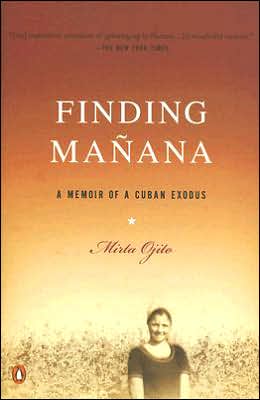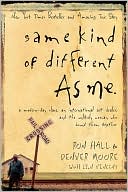Finding Manana: A Memoir of a Cuban Exodus
Finding Mañana is a vibrant, moving memoir of one family's life in Cuba and their wrenching departure. Mirta Ojito was born in Havana and raised there until the unprecedented events of the Mariel boatlift brought her to Miami, one teenager among more than a hundred thousand fellow refugees. Now a reporter for The New York Times, Ojito goes back to reckon with her past and to find the people who set this exodus in motion and brought her to her new home. She tells their stories and hers in...
Search in google:
“New York Times reporter Mirta Ojito melds the personal with the political in a moving account of her family's departure from Cuba.” —People In this unforgettable memoir, Pulitzer Prize—winning journalist Mirta Ojito travels back twenty-five years to the event that brought her and 125,000 of her fellow Cubans to America: the 1980 mass exodus known as the Mariel boatlift. As she tracks down the long-forgotten individuals whose singular actions that year profoundly affected thousands on both sides of the Florida straits, she offers a mesmerizing glimpse behind Cuba's iron curtain—and recalls the reality of being a sixteen-year-old torn between her family's thirst for freedom and a revolution that demanded absolute loyalty. Recounting an immensely important chapter in the ever-evolving relationship between America and its neighbor to the south, Finding Mañana is a major triumph by one of our finest journalists. “In this wonderful memoir, Ojito ransoms herself from the seductions of nostalgia and reclaims instead the beleageured Cuba of her childhood.” —The New York Times The New York Times - Wendy Gimbel … in Finding Mañana, Mirta Ojito's impressive evocation of growing up in Havana in the 1970's, there is no place for nostalgia. In trenchant, muscular prose suitable for describing Cuba's increasingly grim realities, Ms. Ojito, a reporter for The New York Times, writes about her coming-of-age and her family's rescue in the Mariel boatlift of 1980 … Ms. Ojito triggers the memory of a papaya on a hot day in the Cuban countryside: bright color, sweet pulp, bitter seeds.
From Finding Manana by Mirta Ojito\ The police came May 7, 1980, when I was about to have lunch: a plain yogurt, sweetened with several spoonfuls of sugar, fried yellow plantains, and an egg and ketchup sandwich on half a loaf of Cuban bread. I was wearing a bata de casa, a housecoat, over my painstakingly ironed school uniform: a blue skirt with two white stripes around the bottom hem, signaling I was in eleventh grade, and a starched white poplin blouse, which I didn’t want to stain with grease.\ I was just sitting down when I heard the steps on the stairs. Heavy, loud steps. One, two. One, two. One, one, two. I could tell they belonged to a woman and two men. Years of listening to people climb the twenty polished steps that led to our apartment had trained my ear for the idiosyncrasies of footsteps. By the way she paused after every other step, I knew the woman was our downstairs neighbor and la presidenta del comité, the president of the neighborhood watchdog committee. The men were agile and led the way. They skipped several steps and got to the door before I could alert my mother.\ A knock.\ On the red plastic clock above the television set it was fifteen minutes past eleven in the morning. I looked at my mother, who was straightening her skirt at the door to the bedroom, where she had been sewing a dress. Her maroon skirt was littered with pieces of yellow thread. I waited for a signal from her. She heard the knock too, but did not move. Then our neighbor spoke.\ “Mirta,” she called out to my mother, a little out of breath. “Open up. It’s the police. You are leaving.”\ My mother swallowed and opened the door. A burly officer, unshaven and dressed in olive green pants and a white T-shirt with large sweat rings under his arms, walked in. Without introducing himself, he read our names out loud: Orestes Maximino Ojito Denis, Mirta Hilaria Muñoz Quintana, Mirta Arely Ojito Muñoz, and Mabel Ojito Muñoz.\ “Are these the names of the people who live here?” he asked. My mother, who had started to tremble, said yes.\ “There is a boat waiting for you at the port of Mariel,” he said, pausing a bit to gauge our reaction. He went on, “Are you ready and willing to abandon the country at this time?”\ “Yes,” my mother said, her voice merely a whisper.
Prologue11Worms Like Us112Bernardo Benes: Our Man in Miami353Butterflies574Hector Sanyustiz: A Way Out755Ernesto Pinto: An Embassy Under Siege956Unwanted1217Napoleon Vilaboa: The Golden Door1358Leaving Cuba1599Captain Mike Howell: Sailing Manana18710Tempest-Tost21511Teeming Shore23312With Open Arms261Epilogue269Acknowledgments279Notes285Index297
\ Wendy Gimbel… in Finding Mañana, Mirta Ojito's impressive evocation of growing up in Havana in the 1970's, there is no place for nostalgia. In trenchant, muscular prose suitable for describing Cuba's increasingly grim realities, Ms. Ojito, a reporter for The New York Times, writes about her coming-of-age and her family's rescue in the Mariel boatlift of 1980 … Ms. Ojito triggers the memory of a papaya on a hot day in the Cuban countryside: bright color, sweet pulp, bitter seeds.\ — The New York Times\ \ \ \ \ Publishers WeeklyTwenty-five years ago, between April and September 1980, 125,000 Cuban refugees arrived in Florida. Dubbed Marielitos for the port from which they departed and viewed by the press as the refuse of Castro's prisons and mental institutions, these people found a less warm welcome than earlier Cuban groups had. Pulitzer-winning journalist Ojito, then 16, and her family were among them. Her book is both a history of the exodus (which became known as the Mariel boatlift) and a restoration of the reputations of the thousands who "quietly slipped into the fabric of the city that had reluctantly welcomed them." Journalistic sketches of significant figures (the powerful Miami banker who negotiated the 1979 liberation of Cuban political prisoners; the used-car salesman and Bay of Pigs veteran who helped organize the flotilla; the captain of the boat the Ojito family sailed on; etc.) alternate with personal episodes, yet, strangely, the book lacks color. The action is dramatic, but the detail is deadening. For example, Ojito manages to make reading about her adolescent miseries-which can certainly be affecting-tedious and laden with boring rather than illuminating tidbits. And in telling of the duplicities of life under a repressive regime and the anxieties of escape and exile, she isn't able to weed out the important from the trivial. Agent, Heather Schroder. (On sale Apr. 11) Copyright 2005 Reed Business Information.\ \ \ Library JournalIn May 1980, at aged 16, Ojito and her family-mother Mirta, father Orestes, and sister Mabel-found themselves among the thousands of other Cuban refugees, tired, half starved, and hopeful, trying to cross the Florida Strait and reach Miami in what became known as the Mariel boatlift. Here she pieces together the events-both personal and political-that brought her family and so many others like it out of a Cuba whose government they could no longer tolerate. In alternating chapters, we see Ojito in Cuba-where she is ridiculed by a zealous teacher for believing in God and passed over for a scholarship because of her parents' lack of revolutionary fervor-and meet the colorful cast of characters, from Cuban exiles to a Vietnam vet, who set the emigration in motion and carry it through. Although occasionally the narrative jumps can be disorienting, journalist Ojito (a Pulitzer Prize winner for her contribution to the New York Times series "How Race Is Lived in America") manages to weave the disparate threads of the story into a cohesive whole. What results is a rich, but nuanced picture of life in Cuba under Castro and the intimately personal nature of politics. Recommended for public libraries and academic libraries supporting journalism or cultural studies programs.-Tania Barnes, Library Journal Copyright 2005 Reed Business Information.\ \ \ \ \ School Library JournalAdult/High School-For her first 16 years, Ojito was torn between loyalty to the Cuban Revolution and the desire of her parents to leave the country. At school, she learned to be a good Revolutionary child. Extensive dossiers were kept on each student and family; ideological zeal was essential when one's future was controlled by the state. In the neighborhood, block captains tried to force attendance at political assemblies. The girl's parents simply wanted the state to stop interfering in their personal lives. They worked hard to obtain illegal "extras"-including adequate food. In 1980, despite Ojito's ambivalence, the family left in the Mariel boat lift, a five-month exodus during which more than 125,000 Cubans arrived in Florida on small, overcrowded craft. The book alternates between the author's memoir and the stories of others whose actions influenced the boat lift, among them a Cuban American negotiating secretly for the release of Cuban political prisoners and the captain of the Manana, which carried the Ojitos to Florida. The author gives a thoroughly researched account of events before, during, and after they left. Sometimes the narrative bogs down with unnecessary details. The strongest parts, with the most appeal for teens, are about growing up in Cuba, the warmth of family and friends, and the sudden departure and difficult trip into exile. Ojito's voice is honest throughout. She is critical of both governments and initially unimpressed by American culture. Above all, she advocates for the "Marielitos," scorned as criminal scum by Castro and white Floridians alike.-Sandy Freund, Richard Byrd Library, Fairfax County, VA Copyright 2005 Reed Business Information.\ \ \ \ \ Kirkus ReviewsA thorough and exciting account of the events leading to the daring, massive exodus of more than 125,000 people from Cuba's Mariel harbor in 1980. Cuban-American journalist Ojito's mission here is not only to tell her own family's story-they were finally allowed to join relatives in South Florida after waiting 15 years-but to probe a question: How could Fidel Castro allow the hemorrhaging of the Cuban population? Ojito's parents were apolitical and thus undesirable in the communist country, where they were frequently targeted for ridicule and exiles were called gusanos (worms) for abandoning the revolution. Yet by the late 1970s, during the presidency of Jimmy Carter, a thaw began to develop between Cuba and the US, which had imposed an economic embargo on the nation for two decades but now hoped to negotiate for the release of native and American prisoners from Cuba's prisons. Castro trusted Carter's record on human rights and needed to boost a sagging Cuban economy by courting the exiles in America. A successful Cuban living in Panama, Bernardo Benes, was chosen to mediate the detente, which orchestrated return visits by Cuban-Americans (now called mariposas, butterflies) to spend dollars in Cuba. In the spring of 1980, an unemployed bus driver named Hector Sanyustiz made embarrassingly public the desperation of ordinary citizens seeking a way out of the country when he rammed a bus through the Peruvian embassy in Cuba and 10,000 asylum seekers flooded in. Amid complicated diplomatic wrangling, a plan was devised to bring expatriates in southern Florida on chartered boats to Mariel harbor, from which they would transport thousands of undesirable relatives out of the country. Ojito, areporter for the New York Times tells a suspenseful story, moving back from May 7, 1980, when police arrived at her family's Havana doorstep asking if they were willing to "abandon" their country, through the years preceding their triumphant arrival on American soil. A skillful melding of individual personalities with the grand currents of history.\ \








